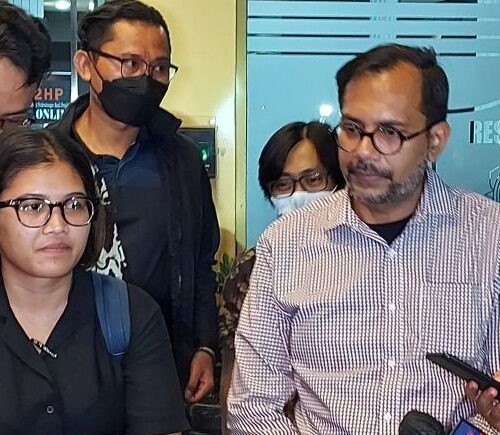Indonesian Human Rights Defenders Prosecuted for Discussion of Investigative Report Should Be Acquitted of Defamation
This statement can be attributed to the Clooney Foundation for Justice. For further inquiries, please contact [email protected]

Indonesian human rights defenders Fatiah Maulidiyanti and Haris Azhar should be acquitted of defamation charges, the Clooney Foundation for Justice’s TrialWatch initiative said in an amicus brief submitted to the East Jakarta District Court. A verdict will be issued on December 18.
The brief, prepared jointly with pro bono counsel Debevoise & Plimpton LLP, states that Maulidiyanti and Azhar should never have been criminally prosecuted given that that the comments for which they were charged concerned the conduct of a government minister—a matter of public interest—and were made in in good faith. The public prosecutor’s office has asked that Maulidiyanti be sentenced to three and a half years in prison and Azhar to four years. The brief contends that the defamation charges and subsequent proceedings violate Indonesia’s treaty obligations under the International Covenant on Civil and Political Rights, which guarantees the right to freedom of expression.
“This case is a crucial test of whether the Indonesian courts are committed to protecting free speech and preventing the justice system from being weaponized against critical voices. Human rights defenders should not face prison time for good-faith reporting,” said Kyle Delbyck, Senior Program Manager at TrialWatch.
In August 2021, Azhar posted a video to his YouTube channel discussing with Maulidiyanti the findings of an investigative report into links between mining operations and military interests in Papua, Indonesia’s easternmost province. The report, issued by ten human rights organizations including KontraS, a Jakarta-based NGO for which Maulidiyanti and Azhar formerly worked, stated that the constellation of economic and military interests had resulted in violence and “Papuan civilians who become the casualty.”
The report further stated that Luhut Binsar Pandjaitan, Indonesia’s Coordinating Minister for Maritime and Investment Affairs and a former military general, had ties to a mining operation in Papua. In the YouTube video about the report, Maulidiyanti similarly stated that Minister Pandjaitan had “a stake in the mining operations that are today ongoing in Papua.” Despite confirming his 99% ownership stake in the parent entity whose subsidiaries at one time had connections to the mining operations at issue, Minister Pandjaitan has denied that he has any stake in mining operations in Papua, claiming that such allegations have damaged his reputation.
Following the publication of the video, in which Maulidiyanti and Azhar also referred to the Minister as ‘Lord Luhut’ (reportedly a name others have used for him too), Minister Pandjaitan filed a criminal complaint. Subsequently, the East Jakarta District Prosecutor’s Office charged the two human rights defenders with cyberdefamation under the ITE Law, Indonesia’s cybercrime law that repeatedly has been used to stifle critical speech. Maulidiyanti and Azhar were also charged with defamation under the Penal Code and with perpetrating a hoax under Law No. 1 of 1946.
TrialWatch has been monitoring the trial against Maulidiyanti and Azhar since it began on April 3, 2023. In addition to this case, TrialWatch has monitored several other cyberdefamation trials under the ITE Law. In one of those cases, journalist Muhammad Asrul was sentenced to three months in prison for cyberdefamation for publishing an article alleging that the son of a mayor was involved in a corruption scandal. In another, a dermatology patient was charged with cyberdefamation merely for complaining on Instagram that a beauty clinic was too expensive and ineffective.
The UN Special Rapporteur on the Situation of Human Rights Defenders has expressed deep concern “at the way defamation laws are being used in Indonesia to undermine the right to freedom of opinion and expression.”
“Power players in Indonesia are exploiting the cybercrime law to intimidate and silence their critics. Even where individuals are eventually acquitted, they spend years mired in criminal proceedings and legal fees, with a severe chilling effect,” added Delbyck.
Indonesia recently announced that it will replace the cyberdefamation provisions in the ITE law with a set of amended defamation provisions in a new criminal code, which is set to go into effect at the beginning of 2026. Although the revised code itself appears flawed in numerous respects, it will at least clearly allow individuals charged with online defamation to claim a public interest defense. If Maulidiyanti and Azhar are convicted for discussing a government official’s alleged links to mining operations (a topic of critical interest in Indonesia and consequently quintessential public interest speech), this would be a huge step backwards.
A verdict in the case of Maulidiyanti and Azhar is expected on December 18. TrialWatch’s brief urges the court to acquit the defendants. TrialWatch also urges the Indonesian authorities to ensure criminal prosecutions are not a means of suppressing freedom of expression, whether under the ITE law or any other existing or future legislation, consistent with President Joko Widodo’s statement that such prosecutions must be “in compliance with the principle of accountability and provide the public [a] sense of justice.”
About the Clooney Foundation for Justice’s TrialWatch Initiative
TrialWatch monitors criminal trials globally against those who are most vulnerable—particularly journalists, democracy defenders, women and girls, LGBTQ+ persons, and minorities. TrialWatch’s work covers more than 40 countries and has led to persecuted individuals being freed or acquitted, and unfair laws reformed, in dozens of cases. TrialWatch is now building a Global Justice Index that will be the first to rank countries on their justice systems through real-world data.